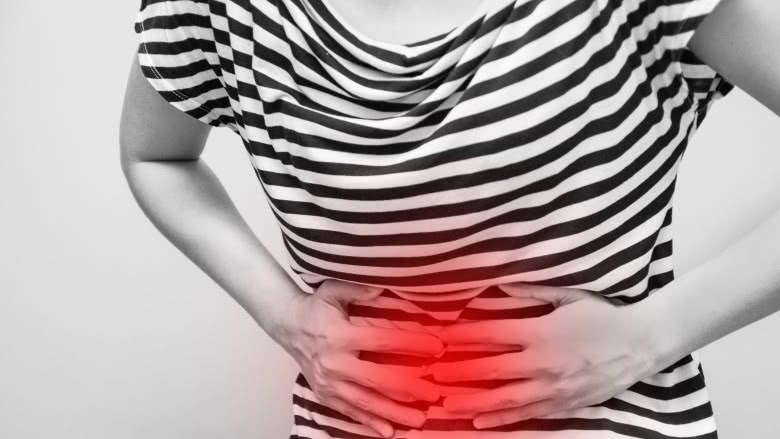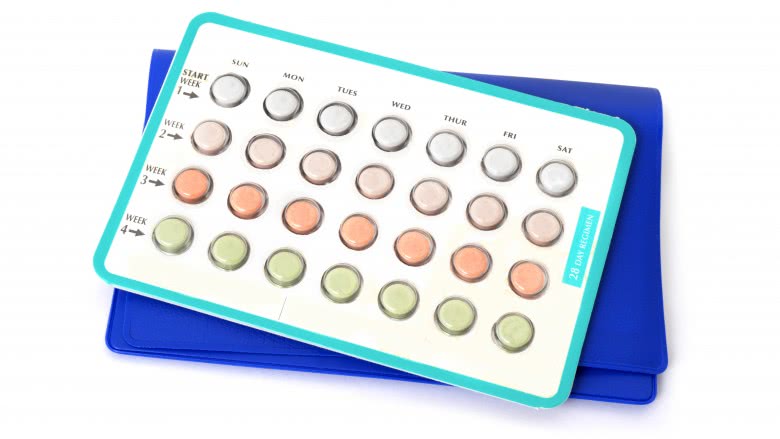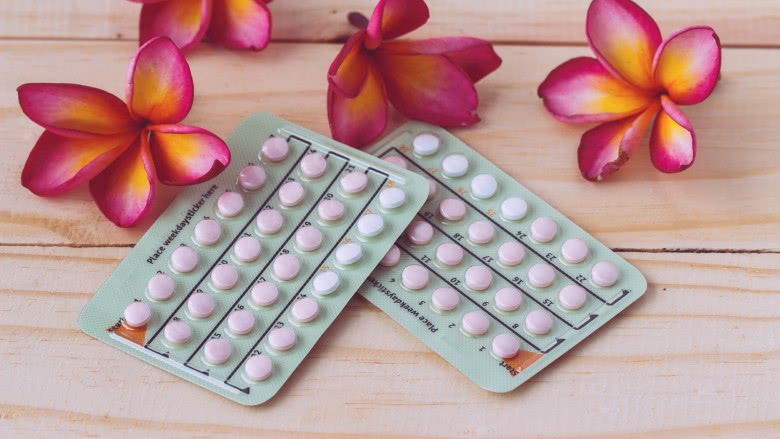Unexpected Benefits Of The Pill
Birth control pills have been available for over 50 years. While many women take them to prevent pregnancy, there are so many other reasons why doctors prescribe them. The pill has lots of unexpected benefits you might not have known about including treating the symptoms of debilitating conditions, clearing up skin issues, preventing hair loss, balancing hormones, and potentially improving quality of life in a variety of ways.
I personally consulted several renowned medical professionals including gynecologists, dermatologists, and an internist to break down the many benefits of the pill and to explain how it works with your body. Please note that individual results may vary and you should always address specific concerns with your own medical provider.
The pill can help clear up acne
According to Dr. Gary Goldenberg, who is a dermatologist in New York City, birth control pills are beneficial for women who want clear skin, stating, "Several studies have shown that the pill improves acne, both comedonal (whiteheads and blackheads) and inflammatory (papules, pustules, and cysts). This is even more pronounced in adult women with acne – and this is the fastest growing acne patient population." Dr. Goldenberg continued, "By controlling and balancing hormonal levels, the pill can improve this type of acne breakout." In general, he said that his patients have seen the oiliness in their skin improve and a reduction in their size of their pores because "hormonal stimulation is important in oil (sebum) production."
However, not all types of birth control pills are useful to women who are looking to control their acne. Dr. Tsippora Shainhouse, who is a dermatologist in Beverly Hills as well as an instructor as the University of Southern California, pointed out that the key to controlling hormonal acne is choosing the right pill because not all types will clear up your skin.
"Birth control pills that contain Drosperinone are best for controlling adult-type, cystic acne that flares on the lower face (chin, neck, jawline) around your period. Progesterone heavy or progesterone-only pills can worsen acne, [but] versions that provide a steady level of estrogen throughout the month can help prevent acne flares."
Regular use of the pill can potentially decrease the risk of some types of cancers
If you are concerned about ovarian and endometrial cancers, Dr. Sal Nadkarni, a Los Angeles based internist, suggested that taking birth control pills might be something you want to explore. "As women age, the uterine wall thickens, which can lead to the development and proliferation of precancerous cells that may eventually become malignant cancer cells," he said. "However, birth control pills prevent thickening of the uterine wall, which can lower the risk of endometrial cancer."
There is also a connection between ovulation and cancer, as Dr. Sal further illuminated, "Women on the birth control pill also ovulate less than women not on the pill. Less ovulation leads to less exposure of the ovaries to hormones that lead to cancer. This leads to a lower rate of ovarian cancer in women on the pill. The longer you're on the pill, the less the risk of ovarian cancer."
The pill can help some women grow their hair out
Dr. Robin Evans, a dermatologist from Stamford, Connecticut, who also serves as a clinical instructor at the Albert Einstein College of Medicine, touts the benefits of oral contraceptives for women to help reverse hair loss that occurs as a result of conditions such as alopecia.
She explained that the pill "may help some women with hair thinning due to genetic causes to hold onto or regrow their hair. [This is because] birth control pills can reduce levels of male type hormones or androgens, which can contribute to hair loss, thus helping to diminish hair loss. Birth control pills [can also] help women maintain their higher estrogen state, which helps women to hold onto their hair."
However, it's important to keep in mind that this treatment does not work in every single case. Dr. Evans noted that certain birth control pills can unfortunately have the opposite affect. "For some women birth control pills or stopping them could both be associated with hair loss as well." If you have or believe you have genetic hair loss, it's best to consult with your personal physician to find the best course of treatment for your individual case.
The pill can help ease the symptoms of PCOS
According to the Office of Women's Health of the U.S. Department of Health and Human Services, one out of every ten women of child bearing age is affected by polycystic ovary syndrome, also known as PCOS. Dr. Shainhouse explained that while birth control pills do not prevent or treat the symptoms of PCOS, they can be part of a larger treatment program.
In order to be diagnosed with PCOS, she described a specific criteria that must be met. "One of the three major criteria for diagnosing PCOS (you need two out of three) is irregular frequency, or absence of ovulation, and hence, menstrual periods. The other two criteria include seeing actual ovarian cysts on ultrasound, and abnormal hormonal lab results. Birth control pills can help regulate the menstrual cycle, which, can make menstrual periods more predictable and potentially help with becoming pregnant, which can be challenging for these women."
The pill can help you control when or if to have your period at all
There are lots of reasons why women may want to skip their periods. This is really easy with the help of birth control pills. Dr. Sophia Yen, who is the co-founder of Pandia health as well as an associate professor of pediatrics in the division of adolescent medicine at Stanford Medical School believes if women do not want to have their periods, there is no good reason why they should.
"The withdrawal week [which is the week you get your period] was only put there to satisfy the church," she revealed. "Once you start on the pill or ring, then you can decide if you want to have your period every month, every three months, or never... Also, if you go on the pill/ring, we can predict your periods from now until you stop taking the pill or ring."
In a blog for Pandia Health, Dr. Yen shared exactly how easy it is to do this. "Just skip the sugar pills or ring-free week and you can literally skip your periods."
The pill can decrease period pain
Painful periods are monthly reality for many women. If the cause of painful periods is a severe hormonal imbalance or endometriosis, taking the pill could be a good way to control it.
Dr. Adeeti Gupta, who is a board-certified obstetrician and gynecologist in New York affiliated with Lenox Hill and Flushing hospitals explained, "Period pain in the absence of physical causes like tumors or fibroids usually occurs due to hormonal dysregulation (imbalance) right before the onset of periods. There is a complicated interaction between the fluctuating estrogen and progesterone levels in the luteal phase (the two week window before the onset of the period)."
Dr. Gupta explained how this works. "The birth control pill produces feedback inhibition to the brain, essentially fooling the pituitary gland into believing that the body has enough estrogen and progesterone. As a result, the brain does not produce such varying levels of estrogen and progesterone throughout the cycle. This creates a steadying effect on hormones, which helps decrease painful periods."
The pill can prevent PMS for some women
The Office on Women's Health of The U.S. Department of Health and Human Services, defines PMS as "a group of symptoms linked to the menstrual cycle [that] can occur 1-2 weeks before your period (menstruation or monthly bleeding) starts." PMS can affect women of any age and the symptoms vary from person to person. The pill can help control these symptoms if PMS occurs as a result of hormonal imbalances.
"The mechanism by which the birth control pill prevents PMS has to do with the small amount of estrogen and progesterone in the pill that fools the brain into stopping its own excess production of the hormones," Dr. Gupta explained. "Normally, the progesterone fluctuation in the last few weeks before the period is the cause of PMS. The birth control pill, however, steadies progesterone levels, resulting in diminished PMS symptoms for women."
However, if the pill does reduce a woman's symptoms, Dr. Gupta suggested a different option. "If the birth control pill alone fails to ameliorate PMS symptoms, some women may benefit from controlled progesterone supplementation supervised by an expert."
The pill can be part of a treatment plan for PMDD
Premenstrual dysphoric disorder, or PMDD, is a severe form of premenstrual disorder. This condition can seriously interfere with the lives of woman who suffer from it. Dr. Robert A. Welch, who is the vice chair of clinical operations – OB/GYN and regional vice president of the Women and Infants Service Line at Detroit Medical Center, explained that birth control pills are only part of the equation for treating PMDD.
"Treatment of PMDD requires not only oral contraceptive pills, but a combination of approaches in an effort to achieve the right balance." Clarifying further, he explained this works because "oral contraceptive or birth control pills (the pill) can have the effect of reducing reoccurring up-and-down hormonal swings between estrogen and progesterone. Birth control pills seem to have the effect of reducing serotonin levels, which stimulate the bad mood, depression, bloating, fatigue, irritability and anxiety associated with PMDD."
There is one pill in particular, Yaz, which is FDA approved for this purpose because it has a "more continuous delivery of lower doses of estrogen over several months." However, Dr. Welch warns Yaz isn't a miracle cure. "Users must be cautious because the repeated use of estrogen can lead to blood clots. Hormones can be completely shut down with medications, like an early menopause, but the risk is bone loss and other concerns."
The pill can potentially protect against pelvic inflammatory disease
Pelvic inflammatory disease (PID) is defined by The Office on Women's Health of The U.S. Department of Health and Human Services, as " An infection of a woman's reproductive organs. [It] is often caused by a sexually transmitted infection (STI). If left untreated, PID can cause problems getting pregnant, problems during pregnancy, and long-term pelvic pain."
Among women who are diagnosed with PID, those who have been taking birth control pills have a better chance at treating this problem, according to Dr. Welch. "Birth control pills have been found in a few well-done studies to reduce the risk of PID. In order for any beneficial anti-inflammatory properties to kick in, a woman has to have taken the pill for at least a year."
But he also noted that taking the pill needs to have been continuous in order to be affective for this purpose, "If [a woman] has taken the pill for more than a year, but stopped for a period of time, the infection protection effects have worn off." In terms of the statistics that show how good birth control pills are at preventing PID, Dr. Welch claimed, "Studies have projected that up to 75,000 cases of PID are prevented every year by birth control pills, which translates to around 12,500 fewer hospital admissions."
Is the pill a magic cure?
After learning all the unexpected benefits of the pill, birth control almost seems like a magic cure-all for so many female problems. After all, how many other pills can clear up acne, ease the discomfort of several medical conditions, help grow hair, and stop your period simultaneously?
Remember, not every woman has the same reaction to all birth control pills and there are many different types on the market. So, if you want to receive the benefits, especially the unexpected ones, it might just be a matter of switching the pill you are currently on. Your doctor will always know what is best for you.











